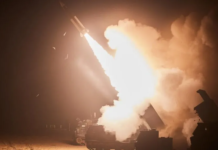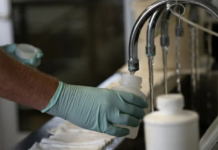President Donald Trump has promised sweeping reforms to “horrendous” US banking regulations that were introduced after the financial crisis.
“We’re going to do a very major haircut on Dodd-Frank,” he said, referring to the Wall Street and consumer protection rules Barack Obama enacted in 2010.
Dodd-Frank aimed to prevent banks taking on too much risk and to separate their investment and commercial arms.
But Mr Trump said he wants “some very strong” change to help the bank sector.
“We want strong restrictions, we want strong regulation. But not regulation that makes it impossible for the banks to loan to people that are going to create jobs,” the president told a group of about 50 business leaders at a White House meeting.
“We’re going to be doing things that are going to be very good for the banking industry so that the banks can loan money to people who need it.”
Mr Trump had promised during his election campaign to relax rules on big banks, and subsequently ordered a review of the industry’s regulations.
Michelle Fleury, the BBC’s New York business correspondent, says Republican policymakers are trying to see how they can pay for tax cuts.
“They are trying to see if there is anything in Dodd-Frank that would save the government money and be used for tax reform,” our correspondent says.
‘Costly and confusing’
But she added that any change would require a major piece of legislation passing through Congress. And Mr Trump’s failure to push through healthcare reforms had shown how tough this might be.
The president’s remarks have the backing of Jamie Dimon, chairman and chief executive of one of the world’s biggest banks, JP Morgan Chase.
In his annual letter to shareholders, released on Tuesday, he said the regulatory burden “is unnecessarily complex, costly and sometimes confusing”.
Dodd-Frank was designed to resolve the too-big-to-fail problem that meant banks facing collapse had to be bailed out rather than wound down.
But Mr Dimon said banks had essentially solved this issue by boosting the capital they held in reserve and introducing tougher risk controls.
source: bbc







